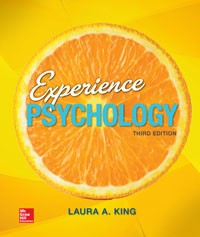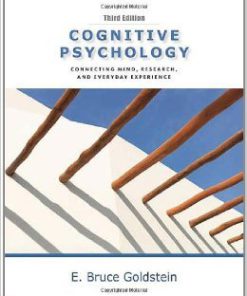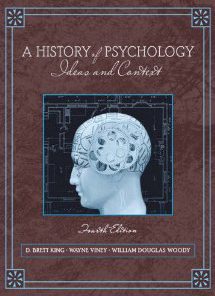Test Bank for Experience Psychology 1st Edition by King
$35.00 Original price was: $35.00.$26.50Current price is: $26.50.
Test Bank for Experience Psychology 1st Edition by King
This is completed downloadable of Test Bank for Experience Psychology 1st Edition by King

Product Details:
- ISBN-10 : 0073405477
- ISBN-13 : 978-0073405476
- Author: King
Its groundbreaking adaptive questioning diagnostic and personalized study plan help students “know what they know” while guiding them to experience and learn what they don’t know through engaging interactivities, exercises, and readings.
After all, to truly understand psychology and all its wonders, one must experience it firsthand. And, luckily, there are so many natural opportunities to do so.
Psychology is all around us—in our relationships, our homes, our communities, our schools, and our work. But linking everyday experiences to the academic discipline of Psychology is not always so easy. Laura King’s Experience Psychology was built to do just that.
Experience Psychology introduces function before dysfunction, building student awareness and understanding by looking first at typical, everyday behavior before delving into the less common—and likely less personally experienced—rare and abnormal.
Experience Psychology places the science of psychology and the research that helps students see the academic underpinnings at the forefront of the course and at the same time offers an abundance of applications that helps students connect the science of psychology to the world around them. At the same time, “Intersections” ensure students experience psychology as the interconnected discipline it is.
Experience Psychology helps students to perform to their maximum potential in and out of the classroom, fully engaging them in the content and experiences that comprise the world’s most popular undergraduate major.
Table of Contents
Preface
xv
The Science of Psychology
1(37)
Defining Psychology and Exploring Its Roots
2(6)
The Psychological Frame of Mind
3(1)
Psychology as the Science of All Human Behavior
4(2)
Psychology in Historical Perspective
6(2)
Contemporary Approaches to Psychology
8(5)
The Biological Approach
8(1)
The Behavioral Approach
9(1)
The Psychodynamic Approach
9(1)
The Humanistic Approach
10(1)
The Cognitive Approach
10(1)
The Evolutionary Approach
10(1)
The Sociocultural Approach
11(1)
Summing up the Seven Contemporary Approaches
11(2)
Psychology’s Scientific Method
13(3)
Types of Psychological Research
16(11)
Descriptive Research
16(3)
Correlational Research
19(3)
Experimental Research
22(2)
Intersection: Social Psychology and Developmental Psychology: Is High Self-Esteem Such a Good Thing?
24(2)
Applications of the Three Types of Research
26(1)
Research Samples and Settings
27(3)
The Research Sample
27(1)
Psychology in Our World: Data Detectives
28(1)
The Research Setting
28(2)
Conducting Ethical Research
30(3)
Ethics Guidelines
30(1)
The Ethics of Research with Animals
31(1)
Challenge Your Thinking: Would Reality TV Pass the Institutional Review Board?
32(1)
The Place of Values in Psychological Research
33(1)
Learning About Psychology Means Learning About You
33(3)
Encountering Psychology in Everyday Life
34(1)
Appreciating Psychology as the Science of You
35(1)
Summary
36(1)
Key Terms
37(1)
Self-Test
37(1)
The Brain and Behavior
38(39)
The Nervous System
39(4)
Characteristics of the Nervous System
39(1)
Pathways in the Nervous System
40(1)
Divisions of the Nervous System
40(3)
Neurons
43(7)
Specialized Cell Structure
43(1)
The Neural Impulse
44(2)
Synapses and Neurotransmitters
46(4)
Neural Networks
50(1)
Structures of the Brain and Their Functions
50(16)
How Researchers Study the Brain and Nervous System
51(2)
How the Brain Is Organized
53(4)
The Cerebral Cortex
57(2)
Challenge Your Thinking: Are Human Brains Uniquely Wired to Recognize Faces?
59(2)
The Cerebral Hemispheres and Split-Brain Research
61(1)
Psychology in Our World: The Iraq War and Traumatic Brain Injury
62(3)
Intersection: Emotion and Neuroscience: Is Your Brain Happy?
65(1)
Integration of Function in the Brain
65(1)
The Endocrine System
66(2)
Brain Damage, Plasticity, and Repair
68(2)
The Brain’s Plasticity and Capacity for Repair
68(1)
Brain Tissue Implants
69(1)
Genetics and Behavior
70(5)
Chromosomes, Genes, and DNA
70(1)
The Study of Genetics
70(3)
Genes and the Environment
73(2)
Summary
75(1)
Key Terms
76(1)
Self-Test
76(1)
Sensation and Perception
77(40)
How We Sense and Perceive the World
78(10)
The Processes and Purposes of Sensation and Perception
78(2)
Sensory Receptors and the Brain
80(2)
Thresholds
82(2)
Perceiving Sensory Stimuli
84(1)
Sensory Adaptation
85(1)
Intersection: Perception and Social Psychology: Was That a Gun or a Cell Phone?
86(1)
Extrasensory Perception
87(1)
The Visual System
88(13)
The Visual Stimulus and the Eye
88(4)
Visual Processing in the Brain
92(2)
Color Vision
94(2)
Perceiving Shape, Depth, Motion, and Constancy
96(5)
The Auditory System
101(7)
The Nature of Sound and How We Experience It
101(1)
Psychology in Our World: Practice “Safe Sound”
101(1)
Structures and Functions of the Ear
102(2)
Theories of Hearing
104(1)
Challenge Your Thinking: Are Cochlear Implants a “Cure” for Deafness?
105(1)
Auditory Processing in the Brain
106(1)
Localizing Sound
106(2)
Other Senses
108(7)
The Skin Senses
108(2)
The Chemical Senses
110(3)
The Kinesthetic and Vestibular Senses
113(2)
Summary
115(1)
Key Terms
116(1)
Self-Test
116(1)
States of Consciousness
117(37)
The Nature of Consciousness
118(5)
Consciousness and the Brain
118(1)
Levels of Awareness
119(3)
Intersection: Consciousness and Developmental Psychology: How Do We Develop a Sense for the Minds of Others?
122(1)
Sleep and Dreams
123(11)
Biological Rhythms and Sleep
123(2)
Why Do We Need Sleep?
125(2)
Stages of Wakefulness and Sleep
127(2)
Sleep and Disease
129(1)
Sleep Disorders
130(2)
Dreams
132(2)
Psychoactive Drugs
134(12)
Uses of Psychoactive Drugs
135(1)
Types of Psychoactive Drugs
136(9)
Challenge Your Thinking: Should Psychedelic Drugs Be Legalized for Medical Uses?
145(1)
Hypnosis
146(3)
The Nature of Hypnosis
146(1)
Explaining Hypnosis
147(1)
Applications of Hypnosis
148(1)
Meditation
149(3)
Psychology in Our World: Meditation at Work
149(1)
Mindfulness Meditation
150(1)
The Meditative State of Mind
150(1)
Getting Started with Meditation
151(1)
Summary
152(1)
Key Terms
153(1)
Self-Test
153(1)
Learning
154(35)
Types of Learning
155(2)
Classical Conditioning
157(9)
Pavlov’s Studies
157(4)
Classical Conditioning in Humans
161(4)
Psychology in Our World: Marketing Between the Lines
165(1)
Operant Conditioning
166(12)
Defining Operant Conditioning
167(1)
Thorndike’s Law of Effect
167(1)
Skinner’s Approach to Operant Conditioning
168(1)
Shaping
169(1)
Principles of Reinforcement
169(1)
Intersection: Behaviorism and Neuroscience: If It Feels Good, Is It Rewarding?
170(6)
Challenge Your Thinking: Will Sparing the Rod Spoil the Child?
176(1)
Applied Behavior Analysis
177(1)
Observational Learning
178(2)
Cognitive Factors in Learning
180(2)
Purposive Behavior
180(1)
Insight Learning
181(1)
Biological, Cultural, and Psychological Factors in Learning
182(4)
Biological Constraints
183(1)
Cultural Influences
184(1)
Psychological Constraints
185(1)
Summary
186(1)
Key Terms
187(1)
Self-Test
187(2)
Memory
189(39)
The Nature of Memory
190(1)
Memory Encoding
191(4)
Attention
191(1)
Levels of Processing
191(1)
Elaboration
192(1)
Imagery
193(2)
Memory Storage
195(12)
Sensory Memory
195(1)
Short-Term Memory
196(2)
Long-Term Memory
198(8)
Intersection: Memory and Sensation: Why Does Smell Share a Special Relationship with Memory?
206(1)
Memory Retrieval
207(10)
Serial Position Effect
208(1)
Retrieval Cues and the Retrieval Task
208(2)
Psychology in Our World: From the Courtroom to KFC: Making It Memorable
210(1)
Special Cases of Retrieval
211(5)
Challenge Your Thinking: Memories: Recovered, Discovered, or False?
216(1)
Forgetting
217(4)
Encoding Failure
217(1)
Retrieval Failure
218(3)
Tips from the Science of Memory—for Studying and for Life
221(4)
Organizing, Encoding, Rehearsing, and Retrieving Course Content
221(2)
Autobiographical Memory and the Life Story
223(1)
Keeping Memory Sharp
224(1)
Summary
225(1)
Key Terms
226(1)
Self-Test
227(1)
Thinking, Intelligence, and Language
228(34)
The Cognitive Revolution in Psychology
229(2)
Thinking
231(11)
Concepts
231(1)
Problem Solving
232(3)
Reasoning and Decision Making
235(3)
Thinking Critically and Creatively
238(2)
Intersection: Emotion and Cognition: How Are You Feeling and Thinking Today?
240(1)
Psychology in Our World: Help Wanted: Critical and Creative Thinkers
241(1)
Intelligence
242(9)
Measuring Intelligence
243(2)
Genetic and Environmental Influences on Intelligence
245(2)
Extremes of Intelligence
247(3)
Theories of Multiple Intelligences
250(1)
Language
251(9)
The Basic Properties of Language
251(1)
Language and Cognition
252(2)
Challenge Your Thinking: Does Gender Influence Language?
254(1)
Biological and Environmental Influences on Language
255(2)
Language Development over the Life Span
257(3)
Summary
260(1)
Key Terms
261(1)
Self-Test
261(1)
Human Development
262(42)
Exploring Human Development
263(3)
How Do Nature and Nurture Influence Development?
264(1)
Nature, Nurture, and You
265(1)
Do Early Experiences Rule Us for Life?
265(1)
Child Development
266(21)
Prenatal Development
266(2)
Physical Development in Childhood
268(4)
Cognitive Development in Childhood
272(4)
Socioemotional Development in Childhood
276(4)
Psychology in Our World: The Joy of the Toy
280(2)
Challenge Your Thinking: Should Parents Be Superheroes?
282(4)
Intersection: Developmental Psychology and Clinical Psychology: Is “Girl Talk” Always a Good Thing?
286(1)
Resilience in Childhood
287(1)
Adolescence
287(4)
Physical Development in Adolescence
288(1)
Cognitive Development in Adolescence
289(1)
Socioemotional Development in Adolescence
289(2)
Rethinking Adolescence
291(1)
Emerging Adulthood, Adult Development, and Aging
291(11)
Emerging Adulthood
292(1)
Physical Development in Adulthood
292(3)
Cognitive Development in Adulthood
295(3)
Socioemotional Development in Adulthood
298(2)
Active Development and Aging
300(2)
Summary
302(1)
Key Terms
303(1)
Self-Test
303(1)
Motivation and Emotion
304(35)
Theories of Motivation
305(2)
The Evolutionary Approach
305(1)
Drive Reduction Theory
306(1)
Optimum Arousal Theory
306(1)
Hunger and Sex
307(9)
The Biology of Hunger
307(2)
Obesity
309(1)
The Biology of Sex
310(1)
Cognitive and Sensory/Perceptual Factors
311(1)
Cultural Factors
312(1)
Sexual Behavior and Orientation
312(4)
Beyond Hunger and Sex: Approaches to Motivation in Everyday Life
316(6)
Maslow’s Hierarchy of Human Needs
317(1)
Self-Determination Theory
317(2)
Intrinsic Versus Extrinsic Motivation
319(1)
Self-Regulation: The Successful Pursuit of Goals
319(2)
Intersection: Motivation and Cognition: How Do We Resist Temptation?
321(1)
Emotion
322(12)
Biological Factors in Emotion
322(3)
Cognitive Factors in Emotion
325(2)
Behavioral Factors in Emotion
327(1)
Sociocultural Factors in Emotion
328(2)
Psychology in Our World: Expressing Ourselves Online: The Psychology of Emoticons
330(1)
Classifying Emotions
331(1)
Challenge Your Thinking: Is a Happy Worker a More Productive Worker?
332(1)
The Adaptive Functions of Emotions
332(2)
Motivation and Emotion: The Pursuit of Happiness
334(3)
Biological Factors in Happiness
334(1)
Obstacles in the Pursuit of Happiness
335(1)
Happiness Activities and Goal Striving
335(2)
Summary
337(1)
Key Terms
338(1)
Self-Test
338(1)
Personality
339(37)
Psychodynamic Perspectives
340(8)
Freud’s Psychoanalytic Theory
340(5)
Psychodynamic Critics and Revisionists
345(2)
Evaluating the Psychodynamic Perspectives
347(1)
Humanistic Perspectives
348(3)
Maslow’s Approach
348(1)
Rogers’s Approach
349(1)
Evaluating the Humanistic Perspectives
350(1)
Trait Perspectives
351(6)
Trait Theories
351(1)
The Five-Factor Model of Personality
352(3)
Evaluating the Trait Perspectives
355(1)
Intersection: Personality and Organizational Psychology: Who’s in Charge?
356(1)
Personological and Life Story Perspectives
357(2)
Murray’s Personological Approach
357(1)
The Life Story Approach to Identity
358(1)
Evaluating the Life Story Approach and Similar Perspectives
359(1)
Social Cognitive Perspectives
359(4)
Bandura’s Social Cognitive Theory
359(2)
Mischel’s Contributions
361(1)
Evaluating the Social Cognitive Perspectives
362(1)
Biological Perspectives
363(5)
Personality and the Brain
363(2)
Personality and Behavioral Genetics
365(1)
Evaluating the Biological Perspectives
366(1)
Challenge Your Thinking: Can Personality Change?
367(1)
Personality Assessment
368(5)
Self-Report Tests
368(2)
Psychology in Our World: Hey, What’s Your Type?
370(1)
Projective Tests
371(1)
Other Assessment Methods
372(1)
Summary
373(1)
Key Terms
374(1)
Self-Test
375(1)
Social Psychology
376(35)
Social Cognition
377(8)
Person Perception
377(2)
Attribution
379(1)
The Self as a Social Object
380(1)
Attitudes
381(4)
Psychology in Our World: Clinching the Sale
385(1)
Social Behavior
385(8)
Altruism
386(1)
Aggression
387(5)
Challenge Your Thinking: Do Violent Video Games Lead to Violence?
392(1)
Social Influence
393(7)
Conformity and Obedience
393(2)
Intersection: Social Psychology and Cognitive Neuroscience: Is the Brain Wired for Conformity?
395(2)
Group Influence
397(3)
Intergroup Relations
400(5)
Group Identity: Us Versus Them
400(2)
Prejudice
402(2)
Ways to Improve Intergroup Relations
404(1)
Close Relationships
405(3)
Attraction
405(2)
Love
407(1)
Models of Close Relationships
407(1)
Summary
408(1)
Key Terms
409(1)
Self-Test
410(1)
Psychological Disorders
411(38)
Defining and Explaining Abnormal Behavior
412(5)
Theoretical Approaches to Psychological Disorders
413(1)
Classifying Abnormal Behavior
414(2)
Challenge Your Thinking: Are Psychological Disorders a Myth?
416(1)
Anxiety Disorders
417(6)
Generalized Anxiety Disorder
418(1)
Panic Disorder
418(1)
Phobic Disorder
419(1)
Obsessive-Compulsive Disorder
420(1)
Post-Traumatic Stress Disorder
421(1)
Psychology in Our World: The Psychological Wounds of War
422(1)
Mood Disorders
423(7)
Depressive Disorders
423(3)
Intersection: Clinical and Developmental Psychology: A Happier Future for Depressed Children?
426(1)
Bipolar Disorder
426(1)
Suicide
427(3)
Eating Disorders
430(3)
Anorexia Nervosa
430(1)
Bulimia Nervosa
431(1)
Causes of Anorexia Nervosa and Bulimia Nervosa
431(1)
Binge Eating Disorder
432(1)
Dissociative Disorders
433(2)
Dissociative Amnesia and Fugue
433(1)
Dissociative Identity Disorder
434(1)
Schizophrenia
435(4)
Symptoms of Schizophrenia
436(1)
Causes of Schizophrenia
437(2)
Personality Disorders
439(3)
Antisocial Personality Disorder
439(2)
Borderline Personality Disorder
441(1)
Combating Stigma
442(4)
Consequences of Stigma
443(1)
Overcoming Stigma
444(2)
Summary
446(1)
Key Terms
447(1)
Self-Test
447(2)
Therapies
449(31)
Biological Therapies
450(7)
Drug Therapy
450(3)
Challenge Your Thinking: Do Antidepressants Increase Suicide Risk in Children?
453(1)
Electroconvulsive Therapy
454(1)
Psychosurgery
455(2)
Psychotherapy
457(11)
Psychodynamic Therapies
458(2)
Humanistic Therapies
460(1)
Behavior Therapies
461(1)
Cognitive Therapies
462(4)
Therapy Integrations
466(1)
Intersection: Clinical Psychology and Neuroscience: Brain Change Through Therapy?
467(1)
Sociocultural Approaches and Issues in Treatment
468(5)
Group Therapy
468(1)
Family and Couples Therapy
469(1)
Self-Help Support Groups
470(1)
Psychology in Our World: Finding Therapy and Support in Cyberspace
471(1)
Community Mental Health
472(1)
Cultural Perspectives
472(1)
The Effectiveness of Psychotherapy
473(4)
Research on the Effectiveness of Psychotherapy
474(1)
Health and Wellness Benefits of Psychotherapy
475(1)
Common Themes in Effective Psychotherapy
476(1)
Summary
477(1)
Key Terms
478(1)
Self-Test
478(2)
Health Psychology
480(1)
Health Psychology and Behavioral Medicine
481(1)
The Biopsychosocial Model
481(1)
The Relationship Between Mind and Body
481(1)
Making Positive Life Changes
482(4)
Theoretical Models of Change
482(1)
The Stages of Change Model
483(3)
Resources for Effective Life Change
486(6)
Motivation
486(1)
Intersection: Health Psychology and Motivation: Why Do We Do the Things We Shouldn’t Do?
487(1)
Social Relationships
488(1)
Religious Faith
489(1)
Personality Characteristics
490(2)
Toward a Healthier Mind (and Body): Controlling Stress
492(7)
Stress and Its Stages
492(1)
Stress and the Immune System
493(1)
Stress and Cardiovascular Disease
494(1)
Stress and Cancer
495(1)
Cognitive Appraisal and Coping with Stress
496(1)
Strategies for Successful Coping
497(1)
Stress Management Programs
498(1)
Toward a Healthier Body (and Mind): Behaving as If Your Life Depends upon It
499(9)
Becoming Physically Active
499(2)
Eating Right
501(1)
Challenge Your Thinking: Can You Be Fat and Fit?
502(1)
Quitting Smoking
503(2)
Psychology in Our World: Making a Career of Good Health
505(1)
Practicing Safe Sex
505(3)
Psychology and Your Good Life
508(1)
Summary
509(1)
Key Terms
510(1)
Self-Test
510
Answers to Self-Quizzes and Self-Tests
1(1)
Glossary
1(1)
References
1(1)
Credits
1(1)
Name Index
1(1)
Subject Index
People Also Search:
experience psychology 1st edition by king
experience psychology by laura king
You may also like…
Test Bank
Downloadable Test Bank for The Science Of Psychology An Appreciative View 2nd Edition King
Solution Manual
Solution Manual for The Science of Psychology: An Appreciative View, 5th Edition Laura King












